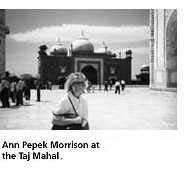

Our Man - and Woman - in HongKong
Two Penn Journalists on the Upcoming Transition
On July 1, Great Britain will hand over control of Hong Kong to China. We asked two long-time journalists who live in Hong Kong, Donald Morrison (C'68), editor of Time Asia, and Ann Pepek Morrison (G'68), editor of Asiaweek, to give us their impressions of the upcoming transition.
Donald Morrison majored in political science and was editor-in-chief of the Daily Pennsylvanian. While undergraduates, he and Ann met at a conference of college editors. Ann did her undergraduate work at the College of New Rochelle and earned an M.A. in American Civilization from Penn. The couple later attended the London School of Economics, with Don as a Thouron Scholar, receiving their M.A.s in 1970. They have had long and distinguished careers as reporters and editors for publications such as Time, Fortune, Time Asia and Asiaweek.
Q. When China resumes control of Hong Kong after years of British rule, what do you believe will be the most important political and social changes?
A. Most people don't expect that there will be any major changes in Hong Kong after the handover, at least not right away. The territory will be run by its own Special Administrative Region government, not by Beijing. There will be an elected local legislature, a court system that continues to use British common law (mainland laws generally won't apply here), and a chief executive selected by a body of 400 local notables (that will rise to 800 when the next one is selected five years from now). The only major Chinese agency in town after July 1 will be the Foreign Ministry, and it will handle mostly visa applications. That said, it's inevitable that Hong Kong will gradually become more "Chinese" after the handover. The top stratum of British civil servants will go home. Britons who remain will have to get work visas, just like the rest of us. A few British place names will change. A few British-owned firms in "strategic" industries - Hong Kong Telecom, the two local electric utilities, Hong Kong and Shanghai Bank (it issues local currency) - might come under pressure to sell out to mainland firms. And you hear worries among businessmen here that "mainland-style" corruption might grow. Otherwise, not much. That's partly because Hong Kong is promised a "high degree of autonomy" by the Anglo-Chinese agreements concerning the handover. It's also because China itself is getting more free, open and capitalist with every new day. In fact, Chinese officials are probably less concerned about making Hong Kong more like the mainland than about how the mainland will become more like Hong Kong!
Q. Hong Kong is currently capitalist. How much will Hong Kong's economy change?
A. Hong Kong's capitalist economy is guaranteed by the above-mentioned agreement not to change for at least 50 years. Hardly anybody here doubts that. And given how fast China is moving toward an open, capitalist economy, there probably won't be much difference between the two places by then. Right now, the stock and property markets are booming, largely because people think that Hong Kong will be an even better place to do business - and to capitalize on the huge market at our doorstep that we'll officially be part of on July 1.
Q. How obvious will the new Chinese influence be on a day-to-day level?
A. Not much will change on a day-to-day level. You may hear more Mandarin spoken, but it'll remain overwhelmed by Cantonese, the local dialect. English may decline, but it'll continue to be taught in schools from the lowest grades, since Hong Kongers know they must have English-language skills to compete in the global economy. There will probably be more mainland tourists - though there are already one million a year, or half of all tourism arrivals. Mainlanders won't be allowed to live here, though, unless they meet the current, very stringent criteria.
Q. How will this change in leadership affect Hong Kong's freedom of the press and freedom of speech?
A. Freedom of speech and the press are guaranteed by the Basic Law, the constitution that will govern Hong Kong after the handover. Every mainland and Hong Kong official we ask about this says that the current level of press freedom in Hong Kong should not deteriorate. Nonetheless, some people claim they've noticed that the local press has begun to exercise self-censorship, refraining from criticizing China. I haven't noticed that, and it's clear that the English-language press here is about as outspoken as before. International publications like ours certainly haven't pulled our punches, and we won't. But we're insulated by our foreign ownership and global reach from the kinds of pressures that might fall on the territory's nearly two-dozen local newspapers - especially the Chinese-language papers, which account for the vast majority of readership. If Beijing wants to intimidate the local press, it'll concentrate on them. And newspapers whose owners have or would like to have business interests on the mainland might be especially vulnerable. But so far, mainland interference hasn't been a serious problem, with one exception. Apple Daily, the territory's liveliest and most anti-Beijing Chinese-language newspaper, has been criticized by mainland officials. Its reporters have been barred from mainland meetings. Its publisher, Jimmy Lai, had regulatory problems on the mainland with his other business, a retail clothing chain (he has since sold it). And it couldn't find a local investment firm willing to underwrite its share offering. Will the rest of us face a similar fate? I mostly doubt it. Chinese officials are clearly serious about maintaining Hong Kong's role as an international financial center. That status would be jeopardized by any attempt to limit the free flow of information. There are, however, two subjects on which they might not behave so rationally: Taiwan and Tibet. A few Chinese officials have said they won't tolerate Hong Kong publications advocating independence for those two places, which they - and most Chinese - regard as part of China. The question is determining the difference between "advocating" and merely reporting. It's going to be interesting to see where the line is drawn.
Q. China is often criticized by outsiders and its own dissidents of human rights violations. Do you foresee the same thing happening when China takes control of Hong Kong?
A. Hong Kong residents enjoy vastly more in the way of human rights than their mainland counterparts, and that will remain the case for a long time. The courts here are independent, the police are largely un-corrupt and the bureaucracy renowned for its efficiency. It would require considerable effort on China's part to change all that, and there's not a lot of reason to do it. What has happened, though, is that a number of recently imposed British laws will be repealed July 1. Among them is one that makes it pretty easy to have a demonstration; the repeal will make it just as difficult as it was a few years ago, when you needed police permission for gatherings of more than 20 people. Also, a newly adopted Bill of Rights is being repealed on the ground (if I understand this correctly) that the Basic Law doesn't allow any other laws to supersede it. Those moves have gained considerable attention in the West, though Hong Kong residents don't seem terribly worried about them. They note that the British ruled Hong Kong in an arbitrary way for most of the past 150 years, and the place still prospered.
Q. How much do you think the lives of westerners residing in Hong Kong will change?
A. Life probably won't change for westerners in any major way. Americans, for instance, will still be allowed to stay here visa-free for up to 30 days, and longer with a visa. There are about 35,000 of us living here now, and those numbers will, if anything, go up. We'll probably see fewer British pubs and more karaoke bars. But we'll still get the Superbowl on TV (live, at 8 a.m.) and more episodes of Baywatch than you'd care to see. And you'll still be able to buy Haagen-Daz at any supermarket (though it'll still cost about $6 a pint).
Q. On a personal note, what impact do you expect on your own lives?
A. We don't expect our lives to change much. We've been here three years and our assignment is open-ended. We return to the U.S. two or three times a year, so it's not as if we're totally cut off. We each maintain an operation here - with staff, commercial space, equipment, contracts with suppliers, etc. - so we'll be acutely aware of any changes in the climate for business and freedom. It's likely that we and other westerners in Hong Kong will become more focused on China. And why not? The place is huge, it's fascinating and it's changing so fast that we have to revise our ideas about it every few months, from one visit to the next. We worry that Beijing and Washington won't be able to manage the Sino-U.S. relationship smoothly - that some new Cold War rivalry will emerge, fed by ignorance and suspicion on both sides. We'll try our best to keep the information flowing, since that's probably the best way to avoid such a tragedy. All in all, we're fortunate to be here at this crucial moment in history.